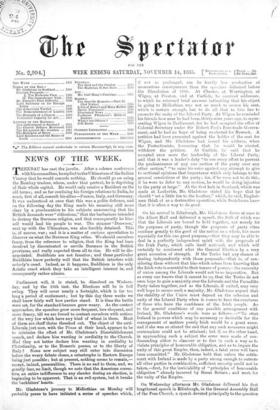On his arrival in Edinbur g h, Mr. Gladstone drove at once
to the Albert Hall and delivered a speech, the drift of which was that the Liberals are bound to hold together, not merely for the purposes of party, though the purposes of party often conduce greatly to the good of the nation as a whole, but more especially for this one great purpose,—that they may be able to deal in a perfectly independent spirit with the proposals of the Irish Party, which calls itself national, and which will certainly be reinforced after the General Election by a very great accession of strength. If the Tories had any chance of dealing independently with those proposals,—that is, of con- sidering them without that bias which arises from knowing that the Irish vote is essential to their tenure of power,— the necessity of union among the Liberals would not be so imperative. But as every one knows that it cannot be so, that the Tories do not even hope to gain a majority over the Liberals and the Parnellite Party taken together, and as the Liberals, if united, may very well hope to secure such a majority, Mr. Gladstone argued that the stability of the Union must depend on the cohesion and unity of the Liberal Party when it comes to hear the overtures of those who have the confidence of the Irish people. As to the general conditions of any possible arrangement with Ireland, Mr. Gladstone's words were as follows :—"To stint Ireland in powers which may be necessary or desirable for the management of matters purely Irish would be a great error, and if she was so stinted the end that any such measures might contemplate could not be attained; but if, on the other band, in approaching such a subject the error were made of con- descending either to clamour or to fear in such a way as to violate principles of honourable obligation, and as to impair the unity of this great Empire, then, indeed, a fatal error will have been committed." Mr. Gladstone held that unless the settle- ment with Ireland is.made by a party strong enough to outvote all other parties in combination, sufficient security could not be taken,—first, for the inviolability of "principles of honourable obligation" already incurred by Great Britain; and next, for the unity of the Empire.






































